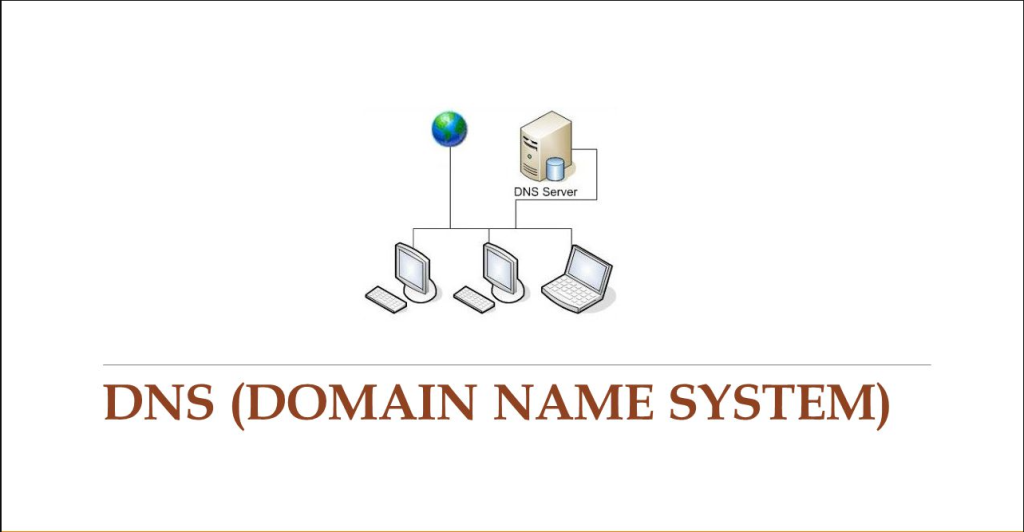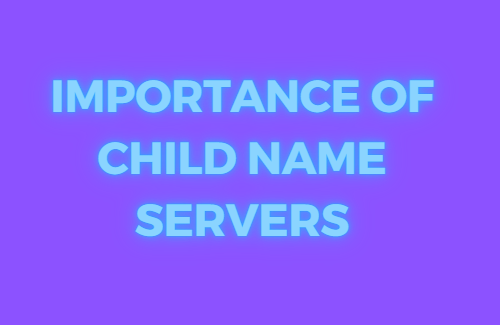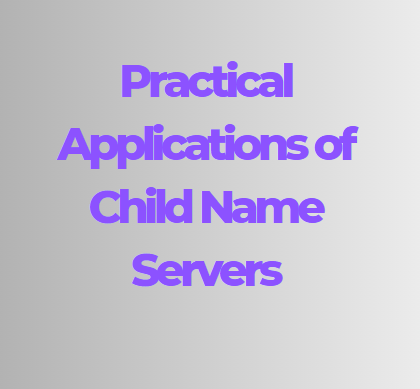
The digital age has fundamentally transformed the way we live, work, and interact with the world. At the heart of this transformation is the internet, a vast network of interconnected devices that rely on a variety of technologies to function seamlessly. One of the critical components of this infrastructure is the Domain Name System (DNS), a hierarchical and decentralized naming system that translates human-friendly domain names into IP addresses. Within this system, the concept of child name servers plays a crucial role in ensuring the smooth operation and management of domain names.
Table of Contents
Understanding DNS and Name Servers

To appreciate the importance of child name servers, it’s essential to understand the basics of the DNS and name servers. The DNS functions like a phone book for the internet, translating domain names (such as www.example.com) into IP addresses (such as 192.0.2.1) that computers use to identify each other on the network. Without the DNS, we would have to remember complex numerical IP addresses to access websites, which is impractical for everyday use.

Name servers are specialized servers within the DNS infrastructure that store and manage the DNS records for a domain. These records contain information about the domain and its corresponding IP addresses. When you enter a domain name in your web browser, the DNS query is sent to a name server, which then returns the IP address associated with that domain, allowing your browser to connect to the correct web server.
What are Child Name Servers?
Child name servers, also known as glue records, are specific types of name servers that are closely tied to the parent domain’s DNS infrastructure. They are essential for maintaining the integrity and functionality of a domain’s DNS records. A child name server is typically a subdomain of the parent domain and is used to delegate the management of a specific portion of the DNS namespace to another entity.
For example, consider the domain “example.com” with child name servers “ns1.example.com” and “ns2.example.com.” These child name servers are responsible for managing the DNS records of subdomains like “sub.example.com.” When a query for “sub.example.com” is made, the DNS system will refer to the child name servers to resolve the IP address.
The Importance of Child Name Servers
It is crucial for several reasons, including DNS resolution efficiency, redundancy, scalability, and security.

1. DNS Resolution Efficiency
One of the primary benefits of child name servers is their role in improving DNS resolution efficiency. By delegating the management of subdomains to child name servers, the DNS system can distribute the load more effectively. This distribution reduces the response time for DNS queries, resulting in faster and more reliable access to websites and online services.
Without child name servers, the parent domain’s name servers would be overwhelmed with queries for every subdomain, leading to slower response times and potential bottlenecks. By using child name servers, the DNS system can handle a higher volume of queries more efficiently.
2. Redundancy and Reliability
Child name servers also contribute to the redundancy and reliability of the DNS infrastructure. By having multiple name servers (both parent and child), the system can ensure that there is always a backup in case one server fails or becomes unreachable. This redundancy is vital for maintaining continuous access to websites and online services, even during hardware failures or network issues.
For instance, if “ns1.example.com” experiences a failure, “ns2.example.com” can still handle DNS queries, ensuring that users can access the domain without interruption. This redundancy is a critical aspect of maintaining high availability and reliability for online services.
3. Scalability
As websites and online services grow, so does the need for scalable DNS infrastructure. Child name servers enable this scalability by allowing domain owners to delegate the management of different subdomains to different name servers. This delegation helps distribute the administrative burden and ensures that the DNS infrastructure can handle increased traffic and complexity.
For example, a large organization with multiple departments and subdomains can use child name servers to manage each subdomain independently. This approach allows each department to have control over its DNS records while maintaining overall coherence and efficiency within the organization’s DNS infrastructure.
4. Security
Security is another critical aspect where child name servers play a significant role. By using child name servers, domain owners can implement security measures specific to each subdomain, enhancing the overall security posture of the domain. This granularity in security allows for tailored access controls, monitoring, and response strategies.
For instance, a company may have different security requirements for its public-facing website and its internal intranet. By using child name servers, the company can enforce stricter security policies on the intranet while maintaining more lenient policies for the public website. This flexibility is crucial for protecting sensitive information and ensuring compliance with security standards.
Practical Applications of Child Name Servers
To further illustrate the importance of child name servers, let’s explore some practical applications in various scenarios.

1. Large Organizations with Multiple Departments
Large organizations often have multiple departments, each with its own subdomain. For example, a university might have subdomains for different departments like “cs.university.edu” for the computer science department and “math.university.edu” for the mathematics department. By using child name servers, each department can manage its DNS records independently, ensuring efficient and accurate DNS resolution.
This approach also allows each department to implement its own security policies and access controls, tailored to its specific needs. The university’s IT department can oversee the overall DNS infrastructure while delegating specific responsibilities to individual departments, resulting in a more scalable and secure system.
2. Web Hosting and Service Providers
Web hosting companies and service providers often manage a large number of domains and subdomains for their clients. Child name servers enable these providers to offer robust and scalable DNS solutions to their clients. By delegating DNS management to child name servers, hosting providers can ensure efficient and reliable DNS resolution for each client’s domain.
For instance, a web hosting company may use child name servers to manage DNS records for thousands of client domains. This delegation allows the company to distribute the DNS load across multiple servers, improving performance and reliability for all clients. Additionally, it enables the hosting company to offer customized DNS services and security features for individual clients.
3. Content Delivery Networks (CDNs)
Content Delivery Networks (CDNs) rely on a distributed network of servers to deliver content quickly and efficiently to users around the world. Child name servers play a crucial role in CDNs by enabling the delegation of DNS management to different servers based on geographic locations.
For example, a CDN may use child name servers to direct DNS queries to the nearest edge server, ensuring faster content delivery and reduced latency for users. This geographic distribution improves the overall performance and reliability of the CDN, providing a better user experience for website visitors.
Challenges and Considerations
While child name servers offer numerous benefits, there are also challenges and considerations to keep in mind when implementing them.
1. Configuration Complexity
Setting up and managing child name servers can be complex, especially for organizations with limited technical expertise. Proper configuration is essential to ensure that DNS queries are resolved correctly and efficiently. Misconfigurations can lead to DNS resolution issues, resulting in website downtime and user frustration.
To address this challenge, organizations should invest in proper training and resources for their IT staff. Additionally, they can leverage DNS management tools and services that simplify the configuration and monitoring of child name servers.
2. Security Risks
While child name servers enhance security by allowing tailored security policies for subdomains, they can also introduce security risks if not properly managed. For example, an attacker could exploit vulnerabilities in a poorly configured child name server to gain unauthorized access to DNS records or disrupt DNS resolution.
To mitigate these risks, organizations should implement robust security measures, such as regular security audits, access controls, and monitoring. It’s also essential to stay informed about the latest security threats and best practices for DNS management.
3. Resource Requirements
Managing child name servers requires additional resources, including hardware, software, and personnel. Organizations need to ensure that they have the necessary infrastructure and expertise to support the deployment and maintenance of child name servers.
For smaller organizations with limited resources, it may be beneficial to partner with DNS service providers that offer managed DNS solutions. These providers can handle the technical aspects of DNS management, allowing organizations to focus on their core business activities.
Conclusion
In conclusion, child name servers are a vital component of the DNS infrastructure, providing numerous benefits in terms of efficiency, redundancy, scalability, and security. They enable the effective distribution of DNS management, ensuring faster and more reliable DNS resolution for websites and online services. By leveraging child name servers, organizations can achieve greater flexibility, performance, and security in their DNS infrastructure.
Despite the challenges associated with configuring and managing child name servers, the benefits far outweigh the risks. With proper planning, training, and resources, organizations can harness the power of child name servers to enhance their digital presence and deliver a seamless online experience for their users. As the internet continues to evolve, the importance of robust and scalable DNS solutions will only grow, making child name servers an indispensable tool in the digital landscape.






